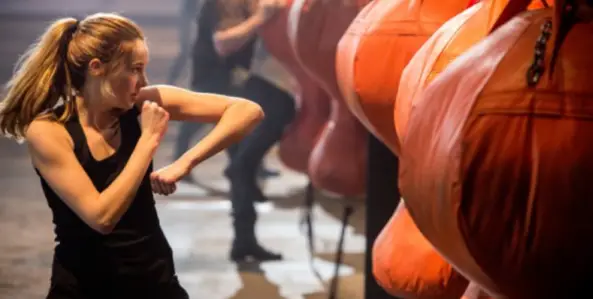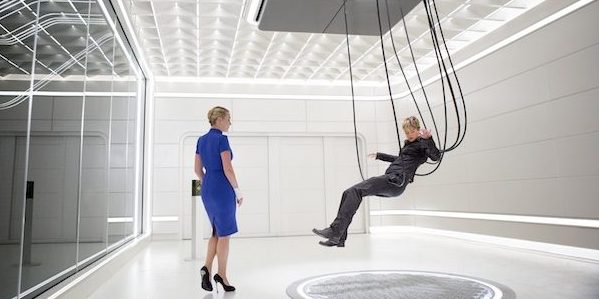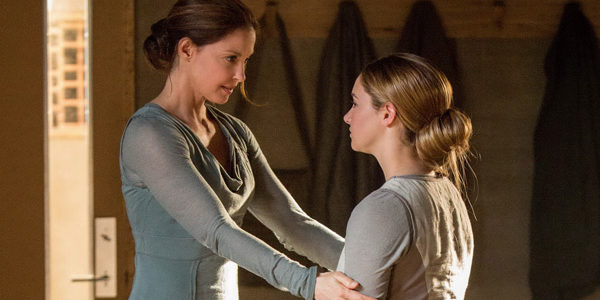How The DIVERGENT Series Helped Me Understand My Identity

Zachary is studying film at the University of Southern California,…
It’s not uncommon to be asked what your favorite or most personally significant film is, it just so happens that mine is often met with a response that in some way begs the question, “why?”
The series, comprised thus far of three films, adapting Veronica Roth’s series of young adult novels, Divergent, Insurgent and Allegiant represents a filmmaking achievement that has allowed me to accept myself in ways I previously had not been able to, and thus, find comfort and security where I previously had none, in terms of who I am. This comes from the development of the series’ central character, Tris Prior (Shailene Woodley).
While I didn’t know initially why the series resonated so deeply with me, I’d later come to understand that the universe was giving me the content that I needed to better understand myself, and, with time, relay that understanding to others.

The basics of the world of the films and books are as follows. For 200 years, in a post-apocalyptic Chicago, a wall has stood around the city. Within its borders, society is divided into five factions, based on virtues. Those who belong to none of the factions are Factionless, and are disenfranchised, the city’s homeless. At age 16, all are put through a simulation that tests them to determine which faction they are most likely to fit into.
It is rare, but the test results can be inconclusive – those with such results must hide this, and choose a faction to join and pretend to belong to. If they don’t, they’ll be found and killed – these are the Divergent. After Tris takes the test, she learns she is one of these people, and must keep her head down in order to survive. We go through this with Tris in the first film, Divergent.
I found, in Tris, a character that I was able to relate to beyond any other I’d previously encountered. I found in her journey and Woodley’s blistering articulation of it, a way to relate myself to others that I previously had been lacking. Her struggles with determining, coming to terms with, concealing, and ultimately, revealing her identity as someone who is Divergent allegorically mirrored my struggles with being romantically attracted to both males and females. I’d not once before experienced what it would be like to see the journey of a character mirror that of my own.
I wonder, had I encountered such a character sooner, perhaps I would have stopped cowering in fear at my own identity. The need to permanently affix a label to one’s self to describe one’s preference of gender has mortified me for years, and Tris’ fear, rage, guilt, and ultimately, acceptance and love of self that she achieves, despite her identity, gave me security I’d not previously had. Her struggle with the label that those around her affix to her by default, her desire for her identity to not be a big deal, not endanger any aspect of her life, and not be something that anyone comments on, is exactly how I feel about my identity.
Factionless vs. Divergent
There are two particular scenes in the series, found in the second film, Insurgent, that carry the most resonance for me. The first is the one during which I figured out why the series, and being Divergent, bears the meaning for me that it does. This is when Tris, Four (Theo James), and Caleb (Ansel Elgort) are seated at a table with the Factionless resistance leader, Evelyn (Naomi Watts). They are at her hideout, where many Factionless have taken refuge.
Evelyn looks at Tris and says “I’m Factionless because I don’t belong to any one Faction, you’re Divergent because you belong to too many.” The moment she spoke this line, it hit me. Tris is who she is not because she doesn’t fit into any category, or Faction, but because she can fit into more than one. I couldn’t place my identity not because I knew I didn’t fit into any category, but because I knew that more than one could apply, and it doesn’t seem like something I should be able to arbitrarily choose.
The second scene exemplifies even deeper meaning for me, and is emblematic of what the Divergent series accomplishes beautifully: the changing arc of what it means to be Divergent. I’ll lay the groundwork for this first. In the first film, Jeanine, the primary antagonist (Kate Winslet, capably playing the best kind of evil, the one that sees nobility in what she is doing) is having Divergents killed upon discovery.
At the opening of the second film, Insurgent, she is instead having them hunted down and captured for a nefarious purpose. This purpose is The Box. It is a reworking of plot elements from the second book for the film, and I see it as a brilliant move by writers Brian Duffield, Mark Bomback and Akiva Goldsman (this film put Duffield on my radar, Bomback and Goldsman were already favorites of mine).
The Trials of The Box
Jeanine and her forces find The Box and learn that it has something in it from The Founders, and they determine the only way it can be opened is by someone who can pass a test for each faction in a simulation, proving they are 100% Divergent. When in a sim, it is populated by the subject’s mind, so the subject is essentially tortured. During the second film, Tris learns she is 100% Divergent. When Jeanine finds out, she is desperate to get Tris wired to The Box. Tris surrenders herself after a number of her allies are threatened, and one is killed.

To prevent further bloodshed, she shows up at Jeanine’s headquarters. The scene that follows is one of the standout times that the combined efforts of Woodley and the filmmakers intersect perfectly to create something mind-bending, moving, and profound. I’ve analyzed this scene closely, and every time I look at it, I am still blown away. If I’m ever able to accomplish anything like the scene I am about to describe, I will have reached a high benchmark.
The scene is this: with Tris wired to The Box, she has to complete the sims for all five Factions, and the scoring by Joseph Trapanese elegantly punches up the already enormously emotional proceedings. In the process, her mind populates the sims with her deepest fears, her greatest desires, and in the end, her darkest thoughts. Each sim presents her, in different ways, with a manifestation of the guilt she feels for merely being who she is.
https://www.youtube.com/watch?v=cmMzu1a1Hy0
The first sim tests bravery. Tris’ mother (Ashley Judd, imbuing her role with a palpable warmth and tenderness), who was killed protecting her in the first film, is now alive. Just as Tris is able to take this in, their home goes up in flames, and floats into the sky. Tris uses every bit of strength she has to run, climb and jump after the house, desperately reaching for her mother. She reaches and saves her, and the two embrace. For a moment, Tris thinks it’s real, and is ripped out into the next simulation. She completes three more sims, each in moving scenes, but the toughest has yet to come. This is where we enter the darkest part of her mind.
The final sim tests one’s inner peace. The first try puts Tris in front of Jeanine, and Tris responds with violence, causing her failure. The next time, she’s faced with Jeanine again, but Jeanine tells her she’s not her opponent. Now, she’ll have to face the one she really hates, herself. Tris looks to the other end of the room, and sees what we’ll call Dark Tris, staring back at her. Woodley, through clever filmmaking techniques, acts opposite herself. She proves her enormous ability as a performer, injecting Dark Tris with hatred and vitriol, and our Tris with fear and rage that becomes compassion and self-acceptance.
The exchange in the scene above speaks to the self-loathing and self-destructive feelings Tris harbors because of her identity, something anyone with an identity that conflicts with societal norms can relate to, something I relate to. Because you don’t fit the mold of society’s expectations of you, you go through stages of self-loathing and hatred. This is the danger of not having compassion and, if anything, tolerance for others. One’s mere otherness, and dealing with that internally, can take one to a dark place. This is before any reactions of others can even be considered.
With the last sim complete, The Box appears and opens. A computer voice tells us we are about to see a message.
The Woman from Outside the Wall
A woman appears in a hologram, telling us she comes from beyond the wall. The faction system was an experiment, but the hope was that there would be people who would transcend the factions, Divergents.
“They are the true purpose of this experiment, they are vital to humanity’s survival. If you’re watching this now, then at least one of you is proof that our experiment has succeeded.”
The message ends, and Tris locks eyes with Jeanine. She says:
“You were wrong about us, you thought we were the problem. We’re the solution.”
From needing to conceal their identity for fear of persecution and death, to being hunted down, captured, and experimented on, to then discovering you are society’s only hope – this is the arc of what it is to be Divergent. Having such an identity starts as a source of fear, and then becomes a source of hope – this is what the series has given me, hope.
The hope comes in the reassurance that what was once something that paralyzed me with fear and confusion can cease doing so, and instead be something that I can find security in. Like Tris, I too may be able to stave off the voices that tell me things she told herself in the Amity sim, “no one’s gonna love you,” “they’re never even gonna miss you” “they’d be better off without you.”

The relief The Divergent Series has provided for me is something I hope to provide in works of my own, as a writer, director and actor. The series opened the floodgates for me in terms of not only accepting myself internally, but it gave me something that allowed myself to do so externally. This is why this series means so much to me, and why I am indebted to the author of the books that became the films, Veronica Roth, the series’ directors Neil Burger and Robert Schwentke, the writers, cinematographers, editors, production designers, composers (Tom Holkenborg and Joseph Trapanese’s music brings so much to the films) and countless others who contributed to the series, and of course, the actors.
Shailene Woodley’s performances across these films are what allowed this all to seep into me, and she’s surrounded by the best of the best. Theo James, Ashley Judd, Kate Winslet, Octavia Spencer, Jeff Daniels, Naomi Watts, Ansel Elgort, Tony Goldwyn, Daniel Dae Kim, Maggie Q, Ray Stevenson, Jai Courtney, Miles Teller, Zoe Kravitz, Mekhi Phifer, Keiynan Lonsdale, Bill Skarsgard, Janet McTeer, and countless more – it is my hope that we get to see this unparalleled group of talented people return to the roles they so beautifully brought to life on screen, in the final chapter of the story. Its status is currently up in the air.
The third film, Allegiant, adapts the first part of the final book, so I am holding out to see the cast return to tell the final part of the story. I’ll be there for it opening day. Until then, I’ll hold onto what the series has given me already – comfort, security, and hope.
Does content like this matter to you?
Become a Member and support film journalism. Unlock access to all of Film Inquiry`s great articles. Join a community of like-minded readers who are passionate about cinema - get access to our private members Network, give back to independent filmmakers, and more.
Zachary is studying film at the University of Southern California, in Los Angeles. He is enamored with blockbuster films (both the hits and the flops) and the tech, toys and tools that go into making them. He aspires to bring an indie sensibility to big films in his career as a writer/director/actor, and looks to writer/director/actors like Jon Favreau and Ben Affleck for inspiration. He is notorious for appreciating films that the masses seem to loathe, and loves film scores and composers. While he loves the big movies, he also loves a good indie (and shouting to the heavens above about said indie). He may or may not have a penchant for collecting Blu-rays, and when not writing/making/talking/reading/listening to film-related material, he likes to do other stuff... like watch TV (and perhaps other things as well).












